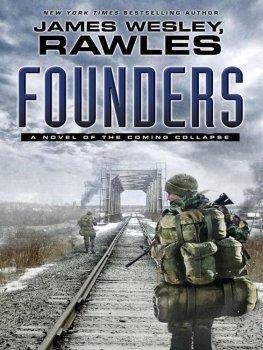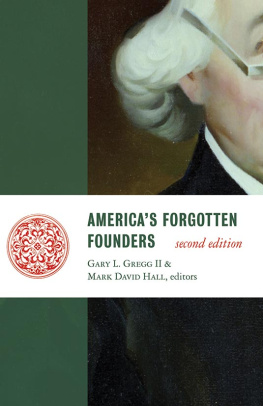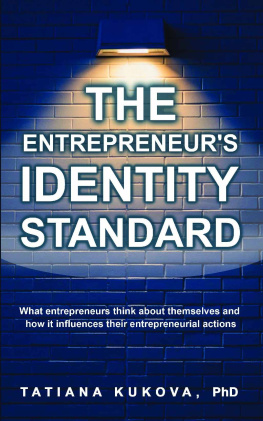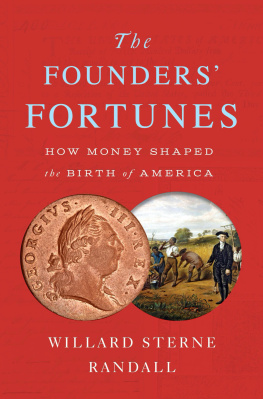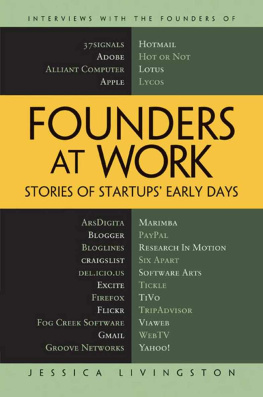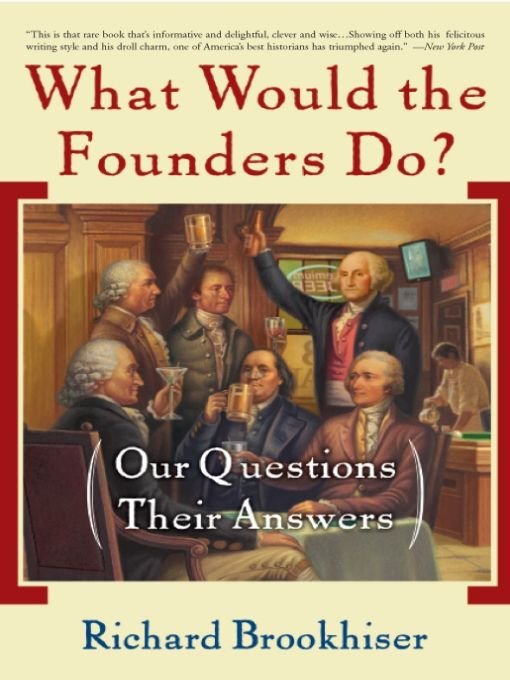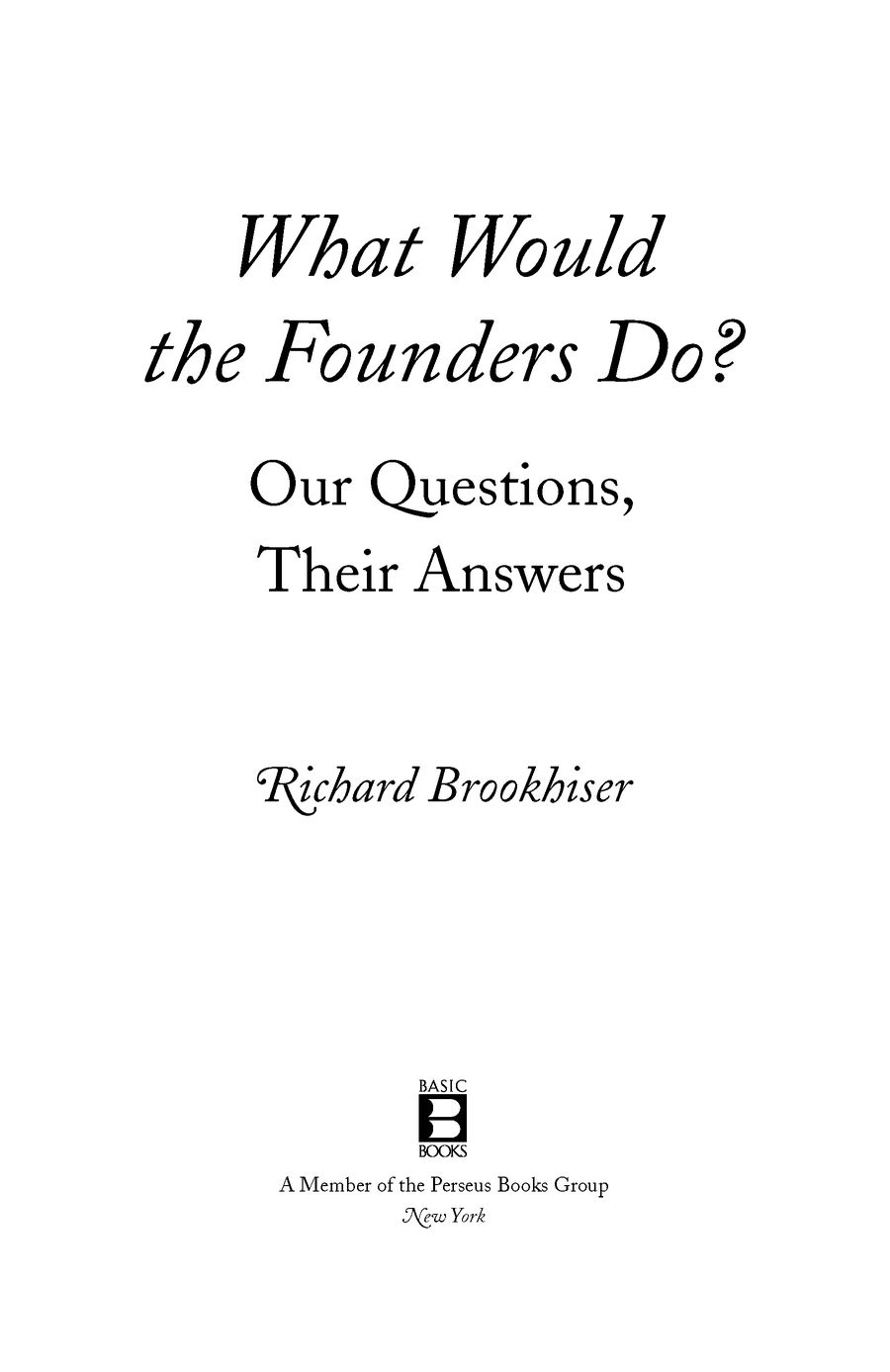Table of Contents
Praise forWhat Would the Founders Do?
Brookhiser writes with grace and economy, and his scholarship in What Would the Founders Do? is sound.
Wall Street Journal
This is a stunning achievement. Few people know the Founders well enough and contemporary issues well enough to have put together such a book, and even fewer have Brookhisers skill at telling the story in so fascinating a way.
FORREST MCDONALD, author of The American
Presidency and Alexander Hamilton
This is that rare book thats informative and delightful, clever and wise.... Showing off both his felicitous writing style and his droll charm, one of Americas best historians has triumphed again.
New York Post
Richard Brookhiser has undertaken a daunting taskaddressing the questions and concerns of 21st century Americans to our 18th century founding fathers. Brookhiser applies the principles and practices of the founders to the problems of our time, and he does so in his usual elegant and witty manner. In so doing he reminds us of the wisdom of the founders, but more importantly, he reminds us of the enduring nature of the fundamental problems confronting a free society.
STEPHEN KNOTT, author of Alexander Hamilton
and the Persistence of Myth
As entertaining as it is informative.... With a rare union of wit and scholarship, What Would the Founders Do? presents history as a source of continuing debates, rather than a set of answers.
Publishers Weekly
What a great piece of work it is! Lively throughout, full of relaxed authority, and with what I really think might be the most stirring final paragraph written by an American since The Great Gatsby.
RICHARD SNOW, editor, American Heritage
A very enjoyable book that portrays the world and thought of our original citizen/leaders to good effect... filled with Revolution-era detail.
Indianapolis Star
In speculating on the Founders answers to contemporary questionsfrom WMD and American imperialism to school vouchers and the English Only movement, from gun control to womens liberationBrookhiser has performed an important service.
National Review
Also by Richard Brookhiser
The Outside Story:
How Democrats and Republicans Re-Elected Reagan
The Way of the WASP:
How It Made America, and How It Can Save It ... So to Speak
Founding Father: Rediscovering George Washington
Rules of Civility:
The 110 Precepts That Guided Our First President in War and Peace
Alexander Hamilton, American
Americas First Dynasty: The Adamses 17351918
Gentleman Revolutionary:
Gouverneur Morris, The Rake Who Wrote the Constitution
For
Paul Russo
A Note on Spelling
Benjamin Franklin wanted Printers to capitalize the first Letters of all Nouns. This suggestion was not adopted, but many other changes occurred in the rules of spelling and punctuating between the founders lifetime and ours. I have mostly retained their spelling, while modernizing their punctuation.
CHAPTER 1
Introduction
WHO CARES what the founders would do? Who believes that the experiences, opinions, or plans of men who lived two hundred years ago could have any relevance to our problems? Who imagines that the founders could answer our questions?
We do. I have heard it with my own ears. Over the past decade, I have given hundreds of talks about the founding fathers, on radio and TV, and to live audiences. Every time there is an opportunity for Q&A, there is at least one question of the form, What would Founder X think about current event, or living person, Y? No subject is too trivial, no problem too difficult. Audiences want to know what the founders would do about guns, taxes, race, the war on drugs, the war in Iraq; about Newt Gingrich, Bill Clinton, George W. Bush. A recent talk about Alexander Hamilton, first treasury secretary, and first (and so far only) former treasury secretary to be shot, was typical. The host was a financial services firm on Park Avenue. The crowd was young to middle-aged, white collarwhite shirtsleeve, on their lunch break. Out of two hundred people, a dozen asked questions. Four wanted Hamiltons opinion about a contemporary issue: the balance of trade, recent decisions of the Supreme Court on federalism, the New York Stock Exchange, and the tone of modern politics (the presidential campaigns of 2000 and 2004 were fresh in everyones mind). The man had been dead for two centuries; the duel he died in is still the most familiar thing about him (that, and his rather GQ-ish portrait on the ten-dollar bill). Yet a crowd whose business is to anticipate tomorrow s business wanted to know what he would think about the stories that were on that days Bloomberg.
Americans have been asking what the founders would do since the founders died. In 1860 Abraham Lincoln kicked off his first presidential campaign with a speech at Cooper Union in New York Citya combined equivalent of an Iowa caucus and an appearance on Oprah. Lincolns issue was whether the federal government could regulate slavery in the territoriesthe unsettled interior of the continent, not yet divided into states. The Supreme Court (in the Dred Scott decision) had said no; Lincoln said yes. At Cooper Union he spent half his debut talk examining what the thirty-nine signers of the Constitution thought about federal regulation of territorial slavery. He concluded that twenty-one of them, including George Washington, agreed with him (perhaps two disagreed; sixteen had no provable opinion). He wrapped himself in Washington. We sustain his policy.... [Y ]ou [that is, the supporters of slavery] repudiate it.
Lincoln won the election; the Civil War began. In 1863, in the Gettysburg Address, he wrapped the Union cause in two founding documents. The first was the Declaration of Independence: the moment (1863 minus four score and seven equals 1776) when Congress stated that all men are created equal. The second was the Constitution, government of the people, by the people, and for the people, which Lincoln hoped would not perish from the earth, echoing We the People who had established that government in the first place.
In the 1930s, with the world mired in the Depression, and various fascisms on the march, Franklin Roosevelt turned to Thomas Jefferson as to a touchstone. In 1938 Jefferson went on the nickel, in place of the Indian brave; Monticello went on the reverse, in place of the buffalo. FDR laid the cornerstone of the Jefferson Memorial the following year. The completed structure was dedicated in 1943, in the midst of World War II (the cherry trees on the Tidal Basin that so beautifully frame it in the spring had been a gift of the City of Tokyo in better times).
Twenty years after the Jefferson Memorial was finished, Martin Luther King Jr. gave his I have a dream speech in front of the Lincoln Memorial. He not surprisingly held up Lincoln and the Emancipation Proclamation as models for future black progress. But he also held up Lincolns predecessors, the architects of our republic, who when they wrote the magnificent words of the Constitution and the Declaration of Independence... sign[ed] a promissory note to which every American was to fall heir. Many of the architects of the Republic, he knew, owned black men; some of them slept with black women they owned. But King laid claim to their words, not as a clever debater stealing rhetorical bases, but as a family member presenting a keepsake. He did not put the founders words to his purposes; he found their purposes anticipating his words.


